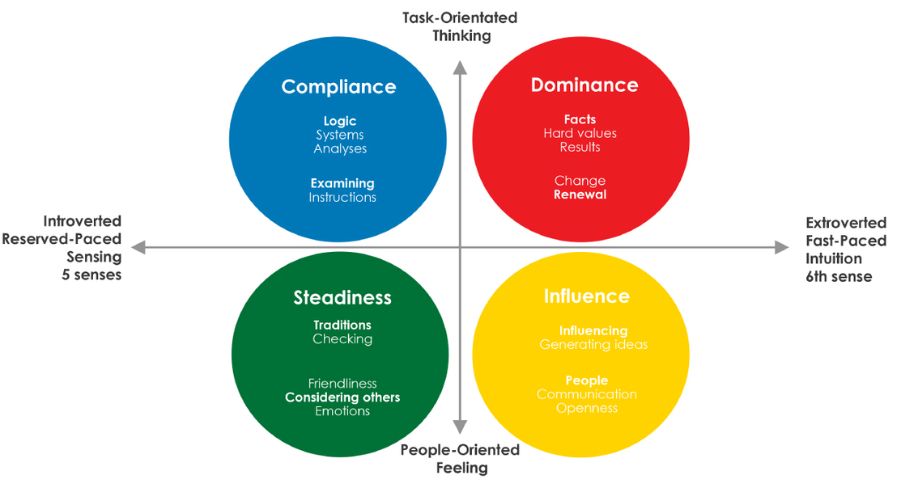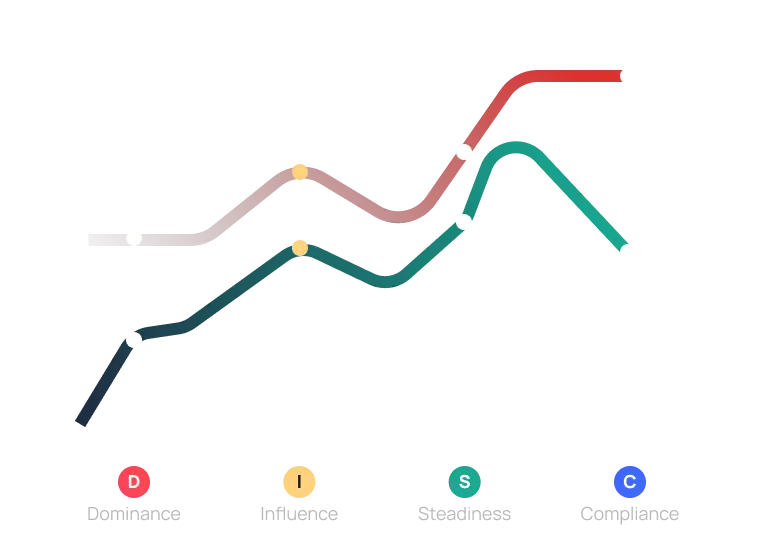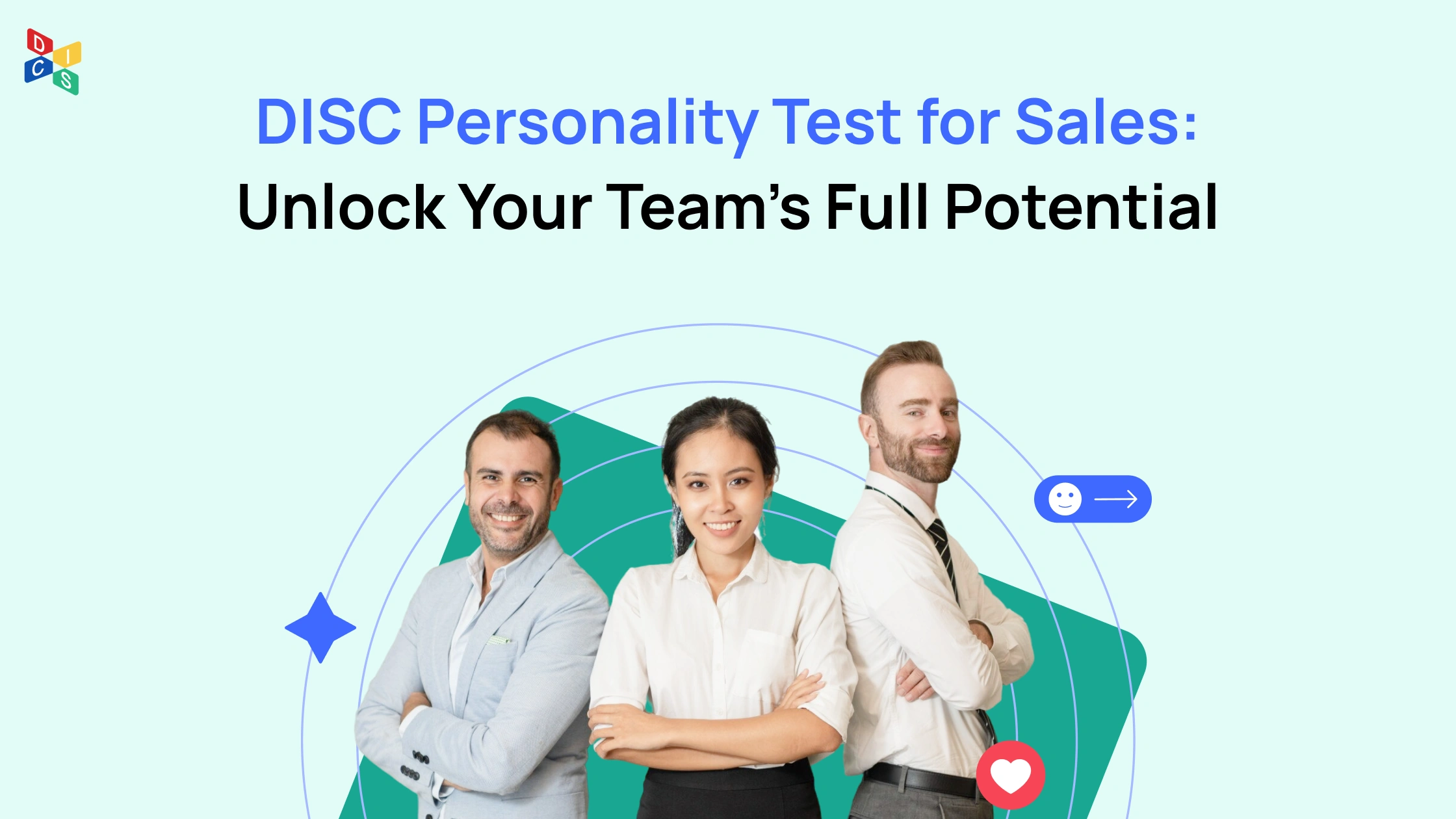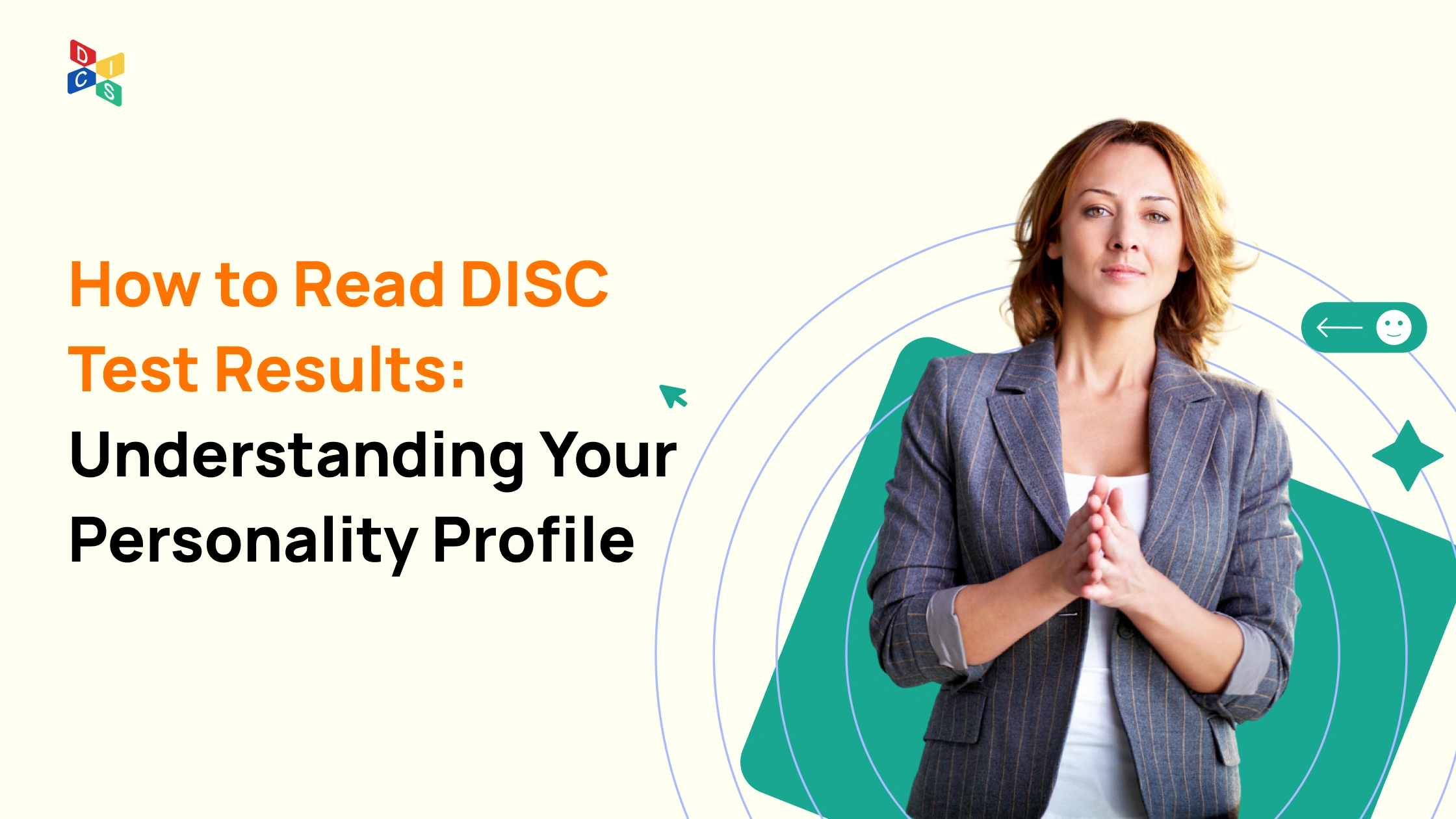Table of content
DISC Motivators Assessment: Unlocking Employee Potential & Motivation
Unlock the power of the DISC Motivators Assessment to boost team performance and motivate employees based on their unique personality traits.
Are you struggling to inspire your team, clients, or prospects effectively? What drives one person may not motivate another, making leadership and sales challenging. The DISC motivations assessment provides a powerful solution by identifying individual drivers and behavioral preferences.
Using DISC insights, you can tailor strategies that genuinely engage employees, enhance teamwork, and boost workplace productivity. Discover how understanding each person’s unique motivators can transform communication, performance, and overall organizational success.
What is the DISC Motivators Assessment?
The DISC motivators assessment is a brief and focused evaluation designed to reveal the core drivers behind an individual’s professional behavior. Comprised of 24 questions with 48 sub-questions, it can be completed within 8 to 12 minutes.
This assessment provides practical insights into what energizes employees, what discourages them, and how they influence the motivation of others in a team setting. By using the DISC assessment, organizations can better understand employee preferences and create conditions that enhance engagement and productivity.

The DISC and motivators assessment produces a clear, six-page report that is easy to understand and apply. The report covers several key areas:
- General Traits: Summarizes the employee’s distinct DISC personality type along with their characteristic behaviors.
- Motivators: Identifies factors that drive enthusiasm and engagement, helping managers leverage strengths.
- Work Demotivators: Highlights aspects of work that can reduce motivation, enabling improved task assignments.
- Motivators in a Team: Explains how the employee typically motivates or inspires colleagues in collaborative projects.
- Motivating Work Environment: Outlines the environmental conditions that enhance engagement and productivity for the individual.
By focusing on these dimensions, the personality test motivation offers actionable guidance for improving employee satisfaction, strengthening team dynamics, and aligning work tasks with individual motivators.
DISC Personality Types and Their Motivators
DISC framework is straightforward, widely applicable, and easy to adopt in workplace settings. It emphasizes observable behavior patterns and evaluates personality tendencies using scales of people-focused/task-focused, and introverted/extraverted, across the 4 main DISC styles: Dominance, Influence, Steadiness, and Compliance. Each style has its unique set of motivators and factors that reduce engagement.
Leveraging insights from a DISC motivators assessment allows managers to tailor their interactions with employees and design work environments that enhance performance. Below, we examine what drives each DISC type.

Dominance (D): Motivators for D types
The D style, also referred to as Dominance, includes individuals who value control, achievement, and taking decisive action. Insights from the DISC assessment reveal that D personalities are energized by autonomy, challenging assignments, and the ability to see tangible outcomes from their efforts.
D personalities excel when they have clear priorities, measurable objectives, and the freedom to make decisions. Conversely, repetitive tasks, heavy oversight, or excessive bureaucracy can diminish their engagement and sense of purpose.
How to Motivate D Personalities:
- Assign projects that allow leadership and initiative.
- Provide immediate recognition and feedback for achievements.
- Allow autonomy and decision-making freedom.
- Set clear objectives and measurable goals.
- Introduce variety and opportunities to create something new.
Influence (I): Motivators for I types
The I style, known as Influence, describes people who are enthusiastic, sociable, and persuasive. According to the DISC motivators assessment, I personalities are driven by social engagement, positive feedback, and opportunities to connect with others.
They thrive in collaborative settings, enjoy exchanging ideas, and gain motivation from being appreciated by peers. Strict rules, rigid processes, or constant criticism can suppress their creativity and enthusiasm.
Strategies to Inspire I Personalities:
- Encourage participation in group projects and team activities.
- Offer public acknowledgment and praise for contributions.
- Maintain open communication and frequent check-ins.
- Promote a supportive and lively workplace atmosphere.
- Avoid unnecessary restrictions and negative feedback.
Steadiness (S): Motivators for S types
The S style, or Steadiness, represents individuals who are dependable, patient, and cooperative. The DISC motivators test shows that S personalities are motivated by predictable routines, secure settings, and the ability to assist others.
S types perform best in structured environments where expectations are clear and feedback is consistent. Sudden changes, high-pressure demands, or uncertainty can reduce their engagement and sense of security.
Tips to Motivate S Personalities:
- Provide clear instructions and consistent workflows.
- Maintain a stable and predictable work environment.
- Recognize reliability and supportive behavior.
- Allow steady progress without rushing tasks.
- Offer opportunities to assist and collaborate with others.
Compliance (C): Motivators for C types
The C style, or Compliance, characterizes individuals who are detail-oriented, analytical, and precise. Findings from the DISC motivators assessment indicate that C personalities are motivated by structured procedures, complete information, and opportunities for mastery in their work.
C types prefer to review information thoroughly and make decisions carefully. Ambiguity, conflicting directions, or pressure for quick responses can lower their engagement and performance.
Guidelines to Encourage C Personalities:
- Provide thorough instructions and complete data.
- Maintain organized workflows and clear processes.
- Allow independent analysis and careful decision-making.
- Emphasize accuracy and attention to detail.
- Avoid pressuring for immediate responses or unclear expectations.
Common Uses of the DISC Motivators Assessment
Understanding what drives individuals at work is crucial for maintaining engagement and productivity. When people feel pressure, stress, or dissatisfaction, it often stems from tasks that drain their energy. By identifying which activities energize or exhaust each DISC personality type, organizations can apply targeted strategies to motivate employees effectively.
The DISC motivators test provides this insight and is widely used across various workplace functions to enhance performance, collaboration, and personal satisfaction.
Recruitment and Selection
In today’s competitive job market, knowing what motivates candidates is essential for successful hiring. The DISC motivators assessment helps recruiters look beyond resumes and interviews by revealing each person’s core drives, preferred work styles, and natural behaviors. Using these insights alongside a DISC personality test explanation, organizations can match candidates to roles that fit their motivations and company culture, which helps reduce turnover and boost long-term engagement.
Key applications include:
- Candidate screening: Identify motivational patterns to determine role suitability.
- Interview design: Tailor questions using the DISC assessment example questions to assess responses under pressure and teamwork dynamics.
- Onboarding support: Highlight areas where new hires may need guidance or encouragement.
- Role alignment: Match individuals to positions that maximize engagement and satisfaction.

Training and Development
Learning is most effective when it resonates with individual motivations. Integrating the DISC assessment into training initiatives allows organizations to design highly personalized programs, keeping participants engaged and energized throughout. This approach ensures that employees not only acquire skills but also feel motivated to apply them effectively in their roles.
Applications include:
- Leadership development: Develop leaders with awareness of team motivational differences.
- Team effectiveness: Improve collaboration by understanding what drives each team member.
- Sales training: Tailor techniques to align with motivational drivers for better performance.
- Customer service programs: Enhance employee engagement and client interactions.
Strategy and Management
Strategic decisions and management practices are most effective when grounded in an understanding of human motivation. The DISC test equips managers with actionable insights to guide organizational initiatives, align team efforts, and cultivate a culture of engagement.
Benefits include:
- Employee engagement: Align tasks and incentives with individual motivators.
- Change management: Smooth transitions by understanding who is motivated by what.
- Conflict resolution: Identify underlying motivational differences to resolve disputes effectively.
- Culture and transformation: Guide initiatives to strengthen organizational culture.
Personal Development
Beyond organizational applications, the DISC motivators assessment provides profound insights for personal growth and self-awareness. Individuals can better understand their drivers, optimize behaviors, and improve interactions in professional and personal settings.
Common applications include:
- Career planning: Make informed choices about professional paths.
- Personal effectiveness: Recognize activities that energize or drain you.
- Family relationships: Enhance communication and understanding within households.
- Marriage counseling: Identify motivational patterns to improve partnership dynamics.
Why Use the DISC Motivators Assessment in the Workplace?
Identifying what drives employees at work is essential for fostering productivity and satisfaction. The DISC motivators assessment offers clear insights into personal motivations, enabling organizations to align roles with each individual’s core drivers. By revealing unique motivational patterns, managers can develop strategies that increase engagement, strengthen team dynamics, and support overall organizational success.
Enhancing Employee Engagement and Performance
Using the DISC motivators test in the workplace can drive engagement and performance by:
- Identifying individual drives: Understanding what motivates each employee helps assign tasks that align with their personal preferences and strengths.
- Boosting commitment and morale: Employees whose motivators are recognized tend to show greater enthusiasm, dedication, and satisfaction.
- Reducing burnout and turnover: Aligning responsibilities with intrinsic motivations minimizes stress and supports long-term retention.
- Encouraging proactive communication: Teams with insight into each other’s motivators communicate more openly and collaborate more effectively.
- Fostering recognition and reward strategies: Tailoring incentives to what employees value enhances motivation and reinforces positive behaviors.

Adapting Leadership to DISC Personality Types
Effective leadership requires a nuanced understanding of individual differences. The DISC assessment equips managers with actionable data to adapt their leadership style according to each employee’s personality profile. Leaders can adjust feedback, delegate responsibilities, and structure incentives that resonate with team members’ motivational preferences.
This personalized management strategy not only strengthens trust but also enhances collaboration, ensuring that team goals are achieved while respecting individual needs.
Creating a Positive Work Environment
Workplaces that integrate the DISC motivators assessment benefit from a more harmonious and supportive culture. Awareness of motivational drivers reduces conflicts by fostering empathy among colleagues and promoting better interpersonal understanding.
Employees gain clarity on their own and others’ motivators, which encourages constructive dialogue, mutual respect, and stronger engagement. Ultimately, this approach contributes to a workplace where individuals feel valued, motivated, and empowered to contribute meaningfully.
Implementing the DISC Motivators Test in Your Organization
Unlocking what drives your team is key to productivity and engagement. The DISC motivators assessment provides clear insights into individual motivations, communication styles, and work preferences.
Integrate the DISC motivators test into onboarding or development programs, offer personalized feedback, and use results to align tasks with strengths. This approach enhances teamwork, reduces conflicts, and supports leadership in understanding employee triggers.
Discover what truly motivates your team - take the DISC test today to improve engagement and performance.
Conclusion
Unlock the full potential of your team with the DISC motivations assessment. By understanding what truly drives each individual, you can create personalized strategies that increase engagement, improve communication, and boost overall productivity. Whether leading employees, managing clients, or guiding prospects, applying DISC insights ensures your approach resonates and inspires action. Take the next step today - leverage the power of DISC to motivate effectively and achieve lasting success across your organization.
FAQs
1. How can DISC assessment improve workplace performance?
By using the DISC assessment, leaders can recognize employees’ motivational triggers and adjust roles, communication, and recognition strategies accordingly. This alignment increases productivity, enhances collaboration, and fosters a positive work culture. Teams become more engaged when their drivers are understood, helping to reduce misunderstandings and improve overall performance.
2. What DISC are most CEOs?
Research indicates that many CEOs display a Dominance (D) profile, characterized by decisiveness, results-orientation, and risk-taking. They tend to focus on goals, drive strategic initiatives, and respond quickly to challenges. However, successful leaders often combine traits from Influence (I) or Compliance (C), balancing assertiveness with collaboration and analytical thinking to lead teams effectively.
3. How often should employees take a DISC motivators assessment?
It is recommended that employees complete the DISC motivators assessment when joining a team and periodically during career development or role changes. Reassessing every 12–18 months helps track shifts in motivation, adapt leadership strategies, and ensure ongoing alignment between individual drivers and organizational goals. Regular use allows managers to make informed decisions on task assignments, coaching, and team composition, improving engagement and overall workplace performance.
4. Can DISC motivators assessment help with career development?
Yes, the DISC motivators assessment provides valuable insights into what drives an individual, highlighting strengths and preferred work environments. By understanding these motivators, employees can make informed career choices, pursue roles that match their natural tendencies, and set realistic growth goals. Organizations can also use the results to design tailored development plans, mentorship programs, and training opportunities, ensuring both personal satisfaction and organizational success.


Don't Let Your Potential Stay Hidden!
Take the DISC test today and discover your unique 'YOU', with deep insights into your true personality and potential.

Represents your instinctive behaviors and desires.
Shows the behavioral tendencies you think you should exhibit in specific situations.
Related articles
You may also be interested in
 DISCJan 06, 2026
DISCJan 06, 2026DISC Personality Test for Sales: Unlock Your Team’s Full Potential
DISC Personality Test for Sales helps sales teams improve role fit and performance. Learn how DISC boosts hiring, coaching, and customer alignment.
 DISCJan 06, 2026
DISCJan 06, 2026How to Read DISC Test Results: Understanding Your Personality Profile
Learn how to read DISC test results and understand your personality profile. Discover how DISC can enhance communication, teamwork, and career growth.
 DISCDec 31, 2025
DISCDec 31, 2025What Is Group Culture? How Team Behaviors Shape Workplace Success
Discover what is group culture and how it shapes team dynamics, decision-making, and performance. Learn how the DISC model can help improve your team’s culture.
